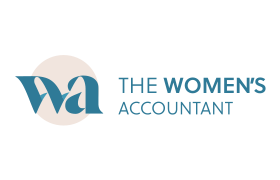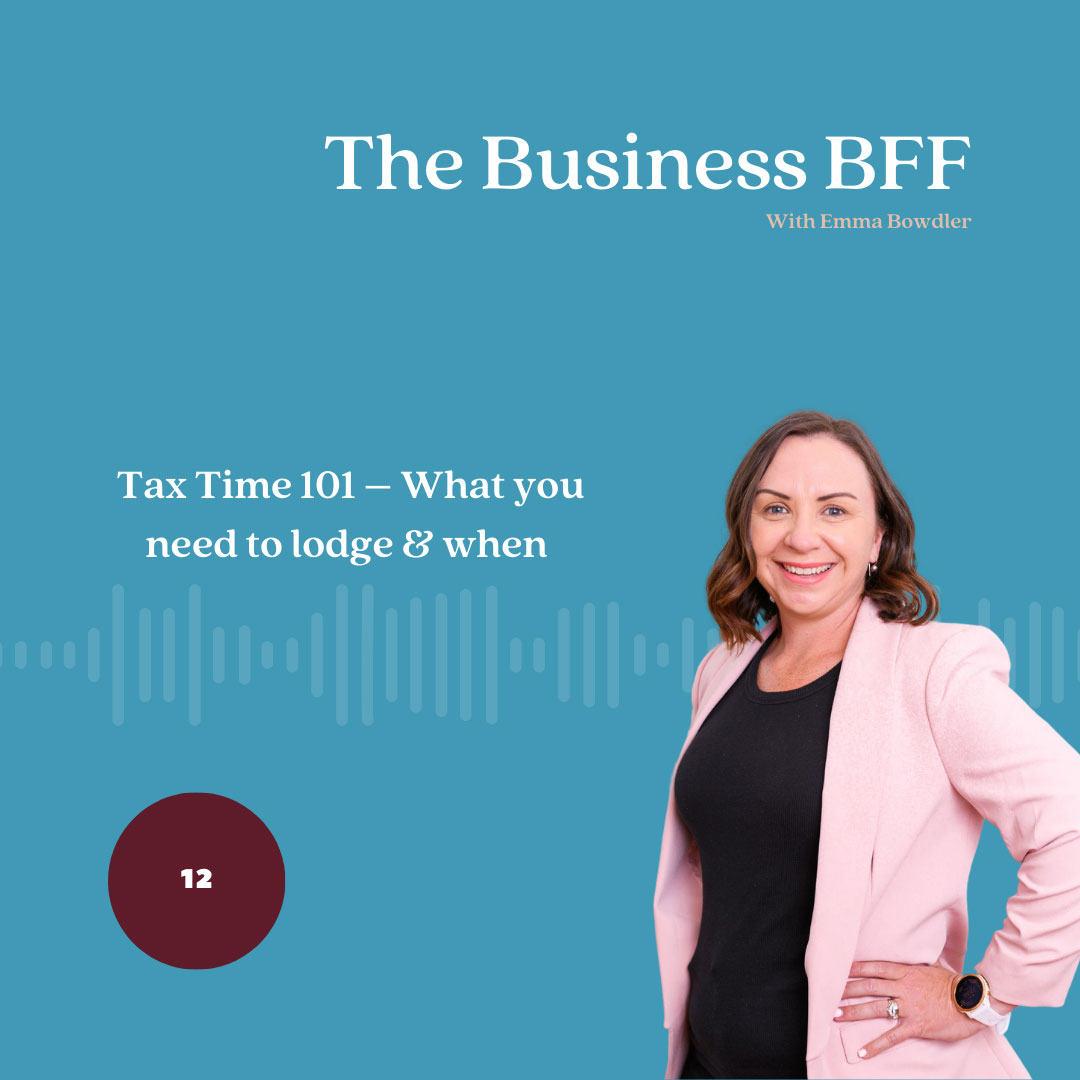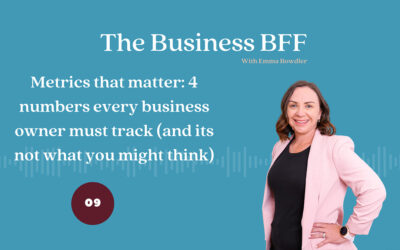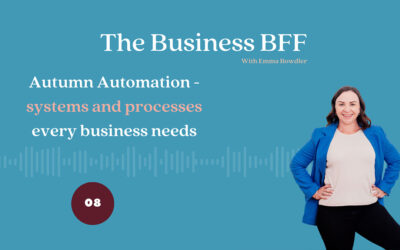The Business BFF Podcast – Episode 12:
Tax Time 101
– What You Need To Lodge & When
6 June 2025
Tax time might not be the fun side of business, but it’s one of the most important—and it doesn’t have to be overwhelming. In this episode, I’m breaking down all the key lodgements you need to know about, from income tax returns and BAS to IAS, super contributions, and even the extra bits like FBT and STP.
I’ll walk you through what they are, who needs to lodge them, and when they’re due, plus what to do if you’re behind. Whether you’re staying on top of your obligations or playing catch-up, this episode will give you a clear roadmap to help you feel organised, in control, and ready to take on tax time like a pro.



temp
Episode Transcript:
📍 Today, we are tackling one of the most boring, but necessary parts of running a business. And that’s tax time. It’s not exactly the fun side of business. And trust me, I’m absolutely with you right there, but it’s something we all have to deal with. In this episode, I’ll talk you through the key lodgements. You need to know about, explain what they are and when they’re due. By the end of this you’ll have a clear roadmap to get through tax time without feeling completely overwhelmed. Let’s get started.
📍 Welcome to the business BFF, the podcast where fierce and fabulous business women come together for the kind of real talk and honest advice only your besties would give. I’m your host Emma Bowdler, founder of the Women’s Accountant, and I’m here to help you navigate the wild world of business, finance, and life.
Whether you are scaling up. Starting fresh or just need a pep talk from someone who gets it, you are in the right place. So grab your favourite bevy and get comfy. It’s time for a chat with your business BFFs.
Okay, tax lodgements, not the most sexy subject to talk about but one that You need to do as a business owner, can’t change it.
It’s just, one of those things we all just have to do. So let’s start with the most obvious one. And that one is your income tax returns. what is an income tax return? It’s your annual lodgment of your business income and deductions. Okay. In short, yes, there’s other bits and pieces in there, but we’re all about business.
So that’s what we’re going to focus on who needs to lodge an income tax return. So if you’re a sole trader, if you were a partnership, if you’re a company, if you’re a trust, if you’ve got a self-managed super fund, you all need to lodge a. return. When is it due? Now, this one changes. So usually if you are self lodging your return or if you’re a new company, your lodgment date will be October 31st. But if you were using a tax agent. Like the women’s accountant, then it’s highly likely that there will be extensions available for you. So instance my clients, most of them are due the 15th of May the following year. So that is definitely a benefit of using a tax agent. The next kind of lodgment is your business activity statements or your BAS. A BAS is a summary of your GST, your PAYG and other tax obligations like your PAYG instalments. Not everybody needs to lodge these, but if you are registered for GST, then you need to. is a, not a mistake, but what a lot of people seem to think that GST is is income tax. If you’re paying PAYG instalments, it includes an element of income tax, but GST is a separate tax to what income tax is. So just keep that in mind. When are they due?
They are always due quarterly following the after the quarter. So the quarters end at June. at September, at December, and at March, so you could expect a lodgement in that next month for those. You can also lodge your BAS monthly. For some people, they choose to do that monthly. For some businesses, it is also annually as well.
If you’re not sure, jump onto your ATO and have a look at when they are. The next type of lodgement is your instalment activity statements or IASs as we make everything shorter here. instalments are for businesses who are not registered for GST but still need to report either PAYG instalments or PAYG withholding for employees. who does need to lodge those? As I said, any business without GST obligations, but still need to report their PAYG. Those ones are due either monthly or quarterly, ATO schedule. Now, something I will make note there is if you are in business and you operate in a Trust situation where you’re receiving distributions from the trust trusts don’t pay tax in their own right.
They distribute the income out to the individuals and they declare that income in their own individual tax return. If that’s the situation for you and you’re receiving distributions, then personally you will have instalments. PAYG instalments attached to your personal income tax account with the ATO.
So just make sure you look at that. Some people will just focus on the business side and not have a look at their individual side. And that’s a really common one that we see at the end of financial year. Then one of the next most common lodgements that you will have is your super guarantee contributions or your SGC. So what is that? So it’s just super payments for your employees, including yourself, if you’re being paid through payroll, who needs to do those. any employer who has got staff who have got a superannuation, they need to do that. They are due generally quarterly and with specific deadlines in July, October, January and April. Now, hot tip for your superannuation. So you need to pay it 10 days before the due date. To allow the clearinghouses to distribute those funds to your employee Superannuation funds if you don’t do that. You do not get a tax deduction for it ever Okay, really common If it’s not received by the employee fund on time You’ll also need to lodge what we call a super guarantee charge statement And the ato will charge you interest and penalties on that one as well So making it really clear that superannuation is a non negotiable, you must pay it in order to A, get the tax deduction and B, not be charged all of those extra interest and penalties. Now there are some other special lodgements for specific business types and one of those is fringe benefits tax. So applies to any business if you provide non cash perks to employees so things like if you’re providing a An employee with a car that’s got private use on it Then you’ll need to lodge an fbt return if you’re providing things like, Tickets or, corporate boxes at sports events, all of those types of things, you will need to lodge a fringe benefits tax return as well.
It’s separate to the other types. Lodgement for those is really bizarre because most people we work off financial year, the FBT year is from the 1st of April to the 31st of March. So an additional lodgement that you’ve got there. And that one is due in May. Of every year. Another special type of lodgement we have is our single touch payroll and it is the ongoing reporting for payroll at the, to the ATO. So STP come into play I don’t know what year it’s been around for a while now where you will file each pay run and that is then reported to the ATO. For every single pay run you do, one of the key dates here is the finalisation that you need to do in July. Okay, so it isn’t just a, you lodge each pay run at the end of financial year, you actually need to go in, reconcile all of that.
Finalise it and then send it to the ATO. Quite often we see we do tax returns for employees where they do have PAYG income or employee income, and their employer hasn’t done that finalisation process. We can actually lodge their tax return and they can actually finalise their tax return until that one’s done.
So if you are in an employer, please make sure that you do that finalisation for your employees by after the last pay run of the year. Another special lodgement is your tax file number declarations. And that’s all about reporting new employee tax details to the ATO. If you’re using software like Xero and, collating their data and entering that, that will file automatically.
You can file that, sorry, directly out of Xero. That’s the rundown of what needs to be lodged and when. And we’ve got a really great little guess, calendar. Of Lodgements that we will link in the show notes for you to be able to download. Obviously, check those to what the ATO is telling you because some of the dates could vary. Now, what should you do if you are behind on Lodgements? first things first, if you’re behind on Lodgements, a deep breath. You are not the only one. And one of my favourite things to do is to bring people up to date with that. Yeah. I understand the ATO understands that life happens.
And for so many business owners, tax obligations can sometimes take a backseat when things get busy. So just for context, if you are one of those people who are feeling behind one of the biggest catch ups I’ve ever had, ever been involved with was for a client who had not lodged anything for 15 years. I won’t lie. It was ugly. There were penalties, but we got through it. And even with the penalties with the interest because of that client circumstances, we were able to get most of it remitted. The sense of relief that they felt when everything was finally up to date was incredible. We were able to negotiate and manage a payment plan for the outstanding lodgements and since then, That client has never missed a lodgeman again, and it’s amazing that what a fresh start and a bit of structure can do because now, they are on top of everything and it’s all set out and laid out and just that burden is no longer there. Do we start this process if you’ve got outstanding tax returns? The first thing is to take it one step at a time. Don’t try to tackle everything at once because it’s too much. What we do here is we start with the most recent lodgements. Like your latest BAS or IAS, and then we work backwards from there, breaking it into smaller steps to make the process far less overwhelming. The next thing we do is we reach out to the ATO. So if you’re worried about the penalties or how much you’re owe, how much you owe, Contacting the ATO can help, so usually open to setting up a payment plan or providing you with support to be able to get you up to date, provided you’re actively working on that. If that feels too overwhelming for you to have that conversation, That’s where your tax agent comes in. Okay. If you’re feeling overwhelmed, then engage an accountant. If it’s one of the things we do is we can guide you through what looking, what catching up looks like. We can have those conversations with the ATO on your behalf. We can even help negotiate a manageable payment plan for you. That’ll take the pressure off your shoulders and ensure that everything is handled in the right way. So once you’re on track, it’s time to keep the focus on staying there. So everything’s caught up, you really need to make a commitment to yourself to stay on track.
And if that means doing things like. Time blocking your diary to get those bits done. Like reconciling your zero accounts, preparing your BAS reports, whatever that looks like, make it a priority. And I think a really powerful thing to do in that space is to remind yourself and sit in that How it felt for you when you were behind and let that be your motivation to never go back there being behind Enlargements doesn’t mean that you’re bad that you’re a bad business owner what it means is that you’re taking the first step to move forward and Trust me when I say, when you do that and you pull your head out of the sand and realise what needs to be done, you will feel so much better. Tax time might not be the most exciting part of business, but with a little planning and some consistency, it doesn’t need to be overwhelming. Whether you’re staying on top of your lodgements or playing catch up, the key is to taking it one step at a time and putting a plan in place to keep things manageable moving forward. you’re feeling behind, remember you’re not alone. There’s always a way forward. And once you get caught up, There will be a huge weight lifted off your shoulders and you won’t have to stress about that again. help you stay organised, we’ve prepared a tax lodgement calendar that outlines all of the key dates that you need to know and you can download it using the link in the show notes.
📍 Thanks for tuning into the business BFF. We hope you’ve found this episode, equal parts, big hug and kick up the bum, all the things a bestie is good for. Remember, you’ve got this and we’ve got your back like only a BFF can. If you’ve loved what you’ve heard, be sure to subscribe, leave a review and share it with your fellow business besties.
Don’t forget to follow us on social media at The Women’s Accountant for. More tips, tricks, and behind-the-scenes fun. Until next time, keep being fierce and oh, so fabulous.
If this episode has resonated with you, or if you’ve got questions about anything we’ve covered today, I’d love to hear from you. Send us a DM over on Instagram @thewomensaccountant and let me know how you’re going with your tax time journey.
Latest Episodes:
Episode 9: Metrics that Matter – 4 Numbers Every Business Owner Must Track (and it’s Not What You Might Think)
Forget obsessing over revenue alone—if you really want to grow your business, you need to track the right numbers. In this episode, Emma Bowdler breaks down four key metrics that most business owners overlook but can make all the difference to your bottom line.
Episode 8: Autumn Automation – Systems & Processes Every Business Needs
In this episode, Emma breaks down the essential processes every business needs to save time, reduce stress, and create a business that runs smoothly—even when you’re not there.
Episode 7: Why Doesn’t My Profit & Loss Match My Bank Account? Here’s What You Need to Know
From GST and loan repayments to asset purchases and drawings, Emma explains the hidden cash flow killers that don’t show up on your P&L—but definitely hit your bank account.
📧 Join Our Mailing List
Never Miss
an Episode:
Join Us!
Subscribe to our mailing list to receive the latest updates from The Women’s Accountant straight to your inbox:



